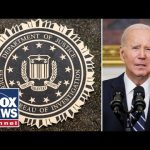In a stunning revelation that has left many scratching their heads, a group of eight U.S. Senators and one Congressman found themselves on the receiving end of FBI surveillance. This curious case was brought to light by none other than Senator Chuck Grassley, who recently orchestrated a confidential briefing for these officials after a whistleblower shared some eye-opening information. The news has raised eyebrows in political circles, as it paints a picture of potential government overreach that could have wide-ranging implications.
During the briefing, which took place on Capitol Hill, the Senators were reportedly taken aback when they learned that the FBI, under the watchful gaze of Jack Smith, had requested the phone numbers and contact details of these lawmakers while Smith was simultaneously prosecuting Trump as a private citizen. It’s as if the FBI has kicked privacy rights out the window for these particular politicians. Grassley characterized the breach of privacy as quite alarming, sparking a firestorm of concern among his peers. They have taken a firm stance, insisting on more information from the FBI, which has promised to deliver additional details by the end of the week.
It’s not just the Senators who were rattled by the news; the chatter among lawmakers indicates this may not have been an isolated incident. Senator Cynthia Lummis hinted at the possibility that other Republican members of Congress might have been under similar scrutiny. Grassley, however, stated that as of now, there have only been eight known targets, with Congressman Mike Kelly being among them. Whether or not there are more names on an unseen list remains an open question, one that Grassley intends to pursue vigorously.
The situation has prompted thoughts of congressional hearings, a rare spectacle in the often-staid world of Washington politics. Senator John Kennedy of Louisiana pointedly suggested that there should be an official hearing to address these startling allegations. Grassley responded diplomatically, hinting that it’s best to wait for more information from the FBI before diving headfirst into public inquiries. This seems to be his way of ensuring that all facts are gathered before any conclusions are drawn.
In a world where privacy is increasingly endangered, this situation could signal a critical moment for the accountability of federal agencies, particularly the FBI. Grassley has built a reputation for following the facts, and it appears he is committed to shining a light on this troubling episode. If nothing else, this unexpected twist in the political landscape serves as a reminder of the power—and sometimes, the pitfalls—of government surveillance. As the days proceed, all eyes will be on Grassley and his colleagues to see how they navigate this murky waters of espionage and accountability, proving once again that in politics, the plot is always thicker than it appears.




